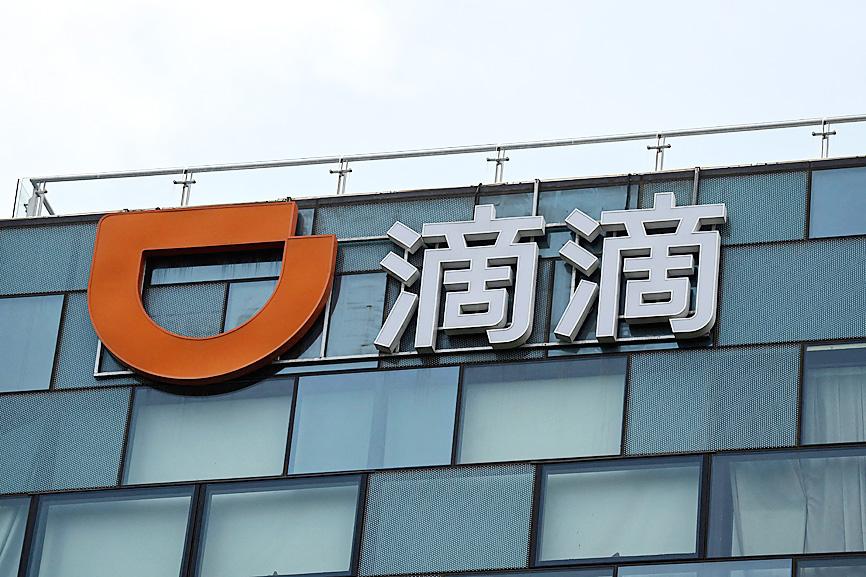Chinese regulators have asked Didi Global Inc’s (滴滴) top executives to devise a plan to delist from US bourses, people familiar with the matter said, an unprecedented request that is likely to revive fears about Beijing’s intentions for its tech industry.
The country’s tech watchdog wants management to take the company off the New York Stock Exchange because of concerns about leakage of sensitive data, the people said, asking not to be identified discussing a sensitive matter.
The Cyberspace Administration of China, the agency responsible for data security in the country, has directed Didi to work out precise details, subject to government approval, they said.

Photo: AFP
Proposals under consideration include a straight-up privatization or a share float in Hong Kong followed by a delisting from the US, the people said.
If the privatization proceeds, the proposal is likely to be at least the US$14 debut price, as a lower offer so soon after the June initial public offering (IPO) could prompt lawsuits or shareholder resistance, the people said.
If there is a secondary listing in Hong Kong, the IPO price would probably be a discount to the share price of US$8.11 as of Wednesday’s close in New York.
Deliberations continue and it is possible that regulators will backtrack on their request, the people said.
Either option would deal a severe blow to a ride-hailing giant that pulled off the largest US debut by a Chinese firm since Alibaba Group Holding Ltd’s in 2014.
Didi sparked the ire of Beijing when it proceeded with its New York stock offering this summer, despite regulatory requests that it ensure the security of its data before the IPO.
Chinese regulators quickly launched multiple investigations into the company and have considered a range of unprecedented penalties, Bloomberg News reported in July.
It is possible that the delisting would be part of a package of punishments for Didi.
Beijing’s municipal government has proposed an investment in the company that would give state-run firms effective control, Bloomberg News reported in September.
Such an investment could help Didi finance the repurchase of its US-traded shares.
Didi is controlled by the management team of cofounder Will Cheng (程維) and company president Jean Liu (柳青), which received aggregate voting power of 58 percent after the company’s US IPO.
Softbank and Uber Technologies Inc are Didi’s biggest minority shareholders.
Even if Didi shifts its listing to Hong Kong, it will have to address the data security concerns that have drawn scrutiny from regulators.
The company might have to give up control of its data to a third party — again undercutting its price tag.
A withdrawal from US bourses could stoke fears of an exodus of Chinese firms as Washington and Beijing quarrel about access to listed firms’ books.
On Thursday, a senior Chinese regulatory official said such delistings would be a setback for relations with the US, while offering broad support for Hong Kong as an alternative venue.
Didi — once feted for defeating Uber in China — has now become a test case for a broader Chinese government effort to curb the power of Internet titans.

In Italy’s storied gold-making hubs, jewelers are reworking their designs to trim gold content as they race to blunt the effect of record prices and appeal to shoppers watching their budgets. Gold prices hit a record high on Thursday, surging near US$5,600 an ounce, more than double a year ago as geopolitical concerns and jitters over trade pushed investors toward the safe-haven asset. The rally is putting undue pressure on small artisans as they face mounting demands from customers, including international brands, to produce cheaper items, from signature pieces to wedding rings, according to interviews with four independent jewelers in Italy’s main

Macronix International Co (旺宏), the world’s biggest NOR flash memory supplier, yesterday said it would spend NT$22 billion (US$699.1 million) on capacity expansion this year to increase its production of mid-to-low-density memory chips as the world’s major memorychip suppliers are phasing out the market. The company said its planned capital expenditures are about 11 times higher than the NT$1.8 billion it spent on new facilities and equipment last year. A majority of this year’s outlay would be allocated to step up capacity of multi-level cell (MLC) NAND flash memory chips, which are used in embedded multimedia cards (eMMC), a managed

Japanese Prime Minister Sanae Takaichi has talked up the benefits of a weaker yen in a campaign speech, adopting a tone at odds with her finance ministry, which has refused to rule out any options to counter excessive foreign exchange volatility. Takaichi later softened her stance, saying she did not have a preference for the yen’s direction. “People say the weak yen is bad right now, but for export industries, it’s a major opportunity,” Takaichi said on Saturday at a rally for Liberal Democratic Party candidate Daishiro Yamagiwa in Kanagawa Prefecture ahead of a snap election on Sunday. “Whether it’s selling food or

In the wake of strong global demand for AI applications, Taiwan’s export-oriented economy accelerated with the composite index of economic indicators flashing the first “red” light in December for one year, indicating the economy is in booming mode, the National Development Council (NDC) said yesterday. Moreover, the index of leading indicators, which gauges the potential state of the economy over the next six months, also moved higher in December amid growing optimism over the outlook, the NDC said. In December, the index of economic indicators rose one point from a month earlier to 38, at the lower end of the “red” light.